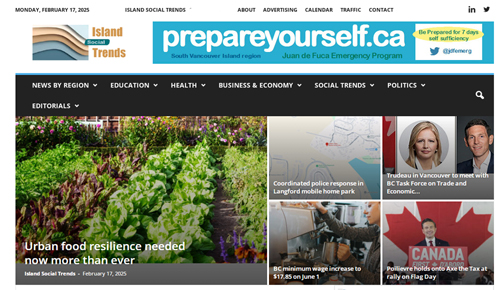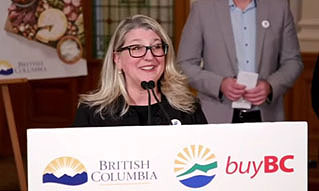
Friday February 21, 2025 | VICTORIA, BC
by Mary P Brooke | Island Social Trends
The large-agriculture and grocery sector comes up big in a new BC task force on food supply and food economy.
Yesterday in the Hall of Honour at the BC Legislature, Agriculture and Food Minister Lana Popham took great pride in announcing the Premier’s task force on agriculture and food economy.
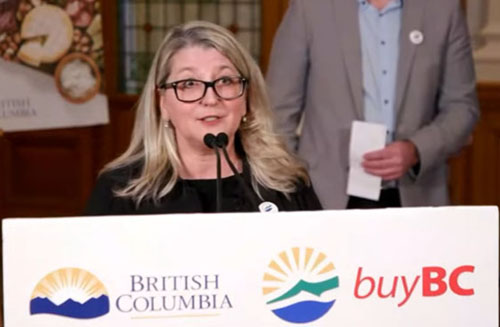
The assembly is made up of three co-chairs and 12 members representing a broad range of regional, commodity and market perspectives.
“Food economy” seems to take prominence over the idea of “food security”. A bit more trendy for 2025 when pushback against the threat of US tariffs looms large.
The key idea is to help farmers find new markets.
Yesterday Popham called this “a real and targeted process”. The focus is on “production, profitability and competitiveness”, she told media.
Politics:
The podium she stood behind included the Buy BC logo, a program she developed when she was Agriculture and Food Minister in the Horgan era (2017 to 2022).

Eby did not initially place Popham in the food and agriculture file when he became premier in November 22; she was shifted out to Tourism, Sport, Arts and Culture, where it took her a while to acclimatize.

A fifth-term MLA, Popham is back in the role of Agriculture and Food Minister as of the November 2024 swearing-in of the new cabinet.
Producers and grocery stores:
In a news release issued about the announcement, Premier David Eby stated the obvious: “All British Columbians want reliable access to healthy and affordable food.”
The task force takes a large scale grocery-store based approach to the food supply challenge.
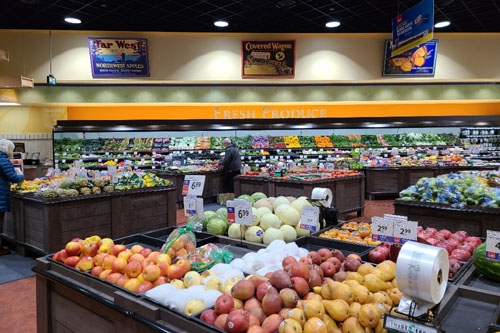
“We must protect our food sources and our agricultural sector in the face of the threat of unfair and damaging tariffs. The respected industry leaders in our task force will provide the government with first-hand knowledge of how to prepare and respond to these threats, as we continue to grow our agricultural sector,” said Eby.
The Premier’s office says that the new task force is a result of ongoing conversations with industry and allows government to work closely with B.C.’s agriculture and food sector to increase the growth and competitiveness of B.C. products.
As well, the Premier’s approach is that the task force’s work will be guided by diverse, knowledgeable and successful leaders, including primary producers from the province’s farming sector, as well as seafood harvesters, food and beverage processors, distributors and retailers.
Local food resilience:
Given the ‘war time’ tone that was present in this week’s BC Throne Speech, the food supply task force shows no sign of shoring up the resilience of every household. Back in WWII every home had a victory garden.
Especially noticeable in this season right ahead of spring planting, there was no mention of household resilience and local small farming as well as emergency supply of food. Groups like Urban Food Resilience Initiatives Society focuses on those strategies.
“Members will also recommend how to ensure people in British Columbia have continued access to healthy and affordable food, no matter what happens with U.S. tariffs or a trade war,” says the BC government news release.
The BC Greens presented a strong framework for food resilience in their Fall 2024 campaign, calling for local food processing, storage, and distribution infrastructure. Back in October 2024 the BC Greens (with whom the BC NDP now have a results-based agreement) offered:
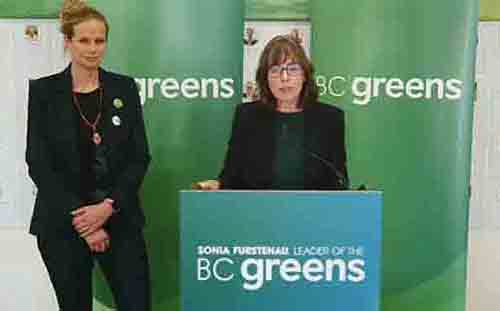
- Expand food security programs, such as regional community food hubs, and increase funding for the Farmers’ Market Nutrition Coupon Program to ensure more healthy, local food reaches those in need.
- Create agricultural water reserves to guarantee a secure water supply for agriculture, safeguarding food production during times of drought or water scarcity.
- Increase funding for local food processing, storage, and distribution infrastructure. Develop policies to support public institutions, such as schools and hospitals, in sourcing a minimum percentage of their food locally.
- Support Indigenous Food Sovereignty by investing in community-led initiatives that enhance access to traditional foods for Indigenous communities.
- Create a universal school food program to ensure every child in British Columbia has access to nutritious food in schools.
“Farmers are on the front lines of climate change, and they need our support to build resilient food systems,” was the BC Greens position.
Task force members:
The task force will have 15 representatives from across the agriculture and food sector. It will be co-chaired by leadership from the BC Agriculture Council, which advocates on behalf of 29 member associations, and BC Food and Beverage, which represents a diverse range of processors throughout the province, along with the deputy minister of the Ministry of Agriculture and Food.
These are the 15 people chosen for task force participation:
Co-chairs:
* Danielle Synotte, executive director, BC Agriculture Council
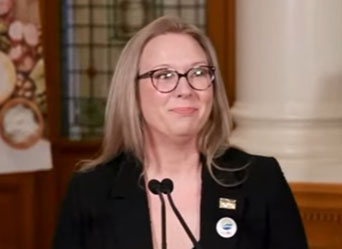
* James Donaldson, CEO, BC Food & Beverage
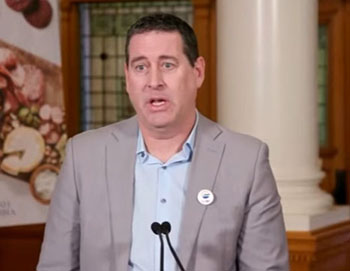
* Michelle Koski, deputy minister, Ministry of Agriculture and Food
Primary producers:
* Jennifer Woike, president, BC Agriculture; president/owner, Farmer Ben’s Eggs
* Annelise Grube-Cavers, co-owner, Fresh Valley Farms
* Nav Bains, vice-president of operations, marketing and procurement, Westberry Farms
* Chris Bodnar, assistant professor at University of the Fraser Valley; co-owner, Close to Home Organic
Processors:
* Angela Doro, president, Freybe Gourmet Foods
* Jasmine Byrne, COO, Big Mountain Foods
* James Pratt, CEO, Rhema Health Products
Seafood:
* Larry Johnson, president, Nuu-chah-nulth Seafood
* Steve Pocock, owner, Sawmill Bay Oysters
Retail:
* Jamie Nelson, president, Pattison Food Group (effective March 1, 2025)
Distribution:
* Cameron Bowles, vice-president of national sales, Sysco
Thought leadership:
* Rory McAlpine, chair, Canadian Agri-Food Policy Institute; retired as senior vice-president, Maple Leaf Foods
Meetings & recommendations:
The group will hold its first meeting next week, virtually, and is expected to meet in person on a quarterly basis over the next 12 to 18 months.
The task force will also provide targeted recommendations to government about key topics, such as water, land, labour, competitiveness and investment.
===== RELATED:
- Urban food resilience needed now more than ever (February 17, 2025)
- Eby appoints BC cabinet committee on economy & tariffs (January 29, 2025)
- Annual pay increase on Dec 31 for farm workers who hand-harvest crops (December 30, 2024)
- National Food Cooperative Strategy introduced by Alistair MacGregor (November 30, 2024)
- BC Greens food security platform highlights water, farming, distribution (October 17, 2024)
- Choose fresh! Packaged convenience foods more costly than they seem (December 8, 2023)
- Food hub gains traction with suppliers, provides training, supports local farmers (August 8, 2022)
- NEWS SECTIONS: FOOD & AGRICULTURE








